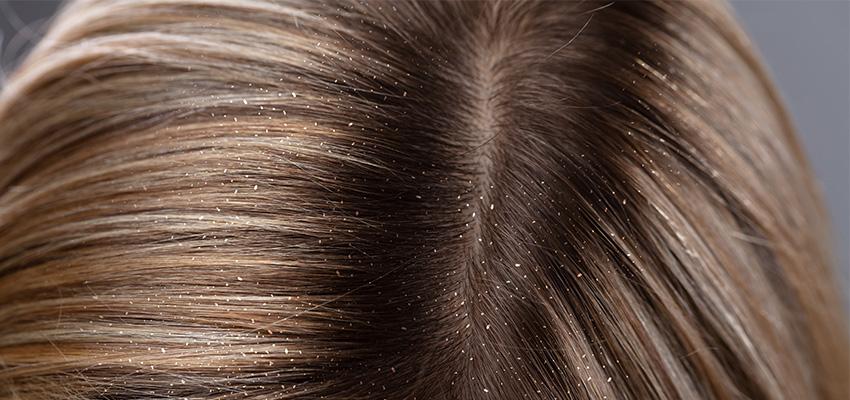It is embarrassing to have dandruff. The problem of dandruff can start early in life. Dry climates and seasonal changes contribute to dandruff as well.
Here is a complete guide on dandruff, its causes, treatment, symptoms and prevention.
Why do people get dandruff?
Dandruff is caused due to imbalances in scalp micro – organisms. The skin on the scalp is home to bacteria and yeast. When imbalances occur amongst these micro – organism dandruffs are formed. Click here to learn more.
What are the causes of dandruff?
The root cause of the dandruff is drying of scalp. However, there are other factors that exacerbate the condition. They are as follows:

- Oily skin – It is caused due to the conditions like dermatitis. Seborrheic dermatitis causes white or yellow scales. It affects the areas that are rich in oil glands. One such area is the scalp
- Dry skin – If a person has dry skin since birth his scalp will also likely to be dry. Else, if the person has eczema, his scalp becomes flaky, dry and itchy
- Not shampooing – If the person does not wash the hair on regular basis, oil cells build up in the scalp. This leads to dandruff. Male hormones called androgen is secreted in both male and female bodies. If the threshold level of these hormones increases, the scalp becomes oily or greasy.
- If the hair is not brushed regularly, the dead skin builds up in the scalp increasing the dandruff
- Over exposure to the sun or heat dries the scalp increasing the dandruff
- Air pollution increases dandruff. This is because chemicals in the air cause irritation and allergic reactions on the scalp. This causes dandruff
- Alkaline shampoo – People with dry scalp and dandruff should use acidic shampoo. This is because the acids make the scalp itchy and flaky. Certain cosmetic hair products build up in the scalp and cause greasiness which leads to dandruff formation.
- Unbalanced diet – One should have Vitamin – B, zinc and fats help to prevent dandruff from developing
- Stress – Stress creates vicious cycle of itch – scratch. The more a person scratches, the itchier the scalp becomes
What are the symptoms of dandruff?
The signs and symptoms of dandruff include
- Itchy scalp, scaly facial skin, recurrent ear
- Oily scalp
- Rashes above eyebrows
- Rashes in the beard areas
- White flakes on shoulders
- Facial skin with dry flakes
- Rashes in the chest with red spots
Dandruff can be located in the areas that have hair follicles.
When to consult a doctor?
Usually dandruff heals after 3 to 4 continuous hair washes. It also vanishes by moisturizing the scalp with oil. But in some cases, it worsens. In such cases, one needs to consult a doctor. Here are certain symptoms that require a dermatologist consult
- Hair loss
- Increasing redness in the follicles
Diagnoses of dandruff
A medical profession easily diagnoses dandruff by just looking at it. However, there are certain cases where the dandruff treatment requires deeper analysis. In such cases the following diagnoses are done
- Skin scrapings
- Microscopic evaluation – the scraped scales are looked under microscope to confirm if they are not fungal infections
- Skin biopsies – A small piece of skin is removed to exclude the causes like lupu, psoriasis and other skin diseases.
What is the prognosis for dandruff?
Dandruff is not curable. However, it is controllable. Dandruffs can be controlled with medicated shampoos. Babies generally out grow their dandruff problems.
Tips to prevent dandruff or get rid of dandruff
- Diet change – High carbohydrate diet can buildup glycogen in the skin. Yeast on the scalp feeds on glycogen. Hence, they outgrow in numbers than that of bacteria. This leads to dandruff. Therefore, one should take less carbs.
- Drink more water – The main reason for dandruff is dryness of scalp. Therefore, one should drink lots of water to keep the scalp hydrated
- Washing the hair more often. One should also moisturize the scalp more often. Make oils sit on the scalp for longer duration. This prevents the accumulation of dead skin that makes the scalp dry.
- Exfoliating the scalp. Exfoliating the scalp lifts the top layer of the dry skin. One can use salicylic acid to exfoliate the scalp. Click here to learn more.
- Oil based treatments help to reduce dandruff. The treatment controls the excess oil production. Applying oil attracts like substances and helps to remove the oil inside the scalp. Gently apply warm oil on the scalp to achieve this.
- Never go for a special shampoo. Every shampoo acts the same way on the dandruff. There are certain products in the market which comes with a tag “anti – dandruff”. Any shampoo with salicylic acid is a good cure for dandruff.
- If one insists on using such shampoos, then make sure to wash the scalp alone. This is because anti – dandruff shampoos dry the hair.
- Avoid scratching. This is because, it increases dandruff in the scalp. Also, scratching causes inflammation and irritation.
- Use of pyrithione zinc shampoos – they reduce the fungus in the scalp
- Tar based shampoo – It helps to cure conditions like seborrheic dermatitis, dandruff and psoriasis. It slows down the dying of skin cells in the scalp.
- Shampoos in salicylic acid – these are fast cures. However, leaves the scalp dry.
- Selenium sulfide shampoos – It slows the skin cells from dying. Rinse well after use. This is because they can discolor the blond, grey or chemically colored hair.
- Ketoconazole shampoo – It is an anti – fungal agent.
These shampoos have to be used regularly till the dandruff is controlled.
Dandruff is worst in winter
Of all season, dandruff is triggered in winter. This is because people tend to eat more foods that commonly trigger dandruff in winter. Most people do not shampoo in colder months.
